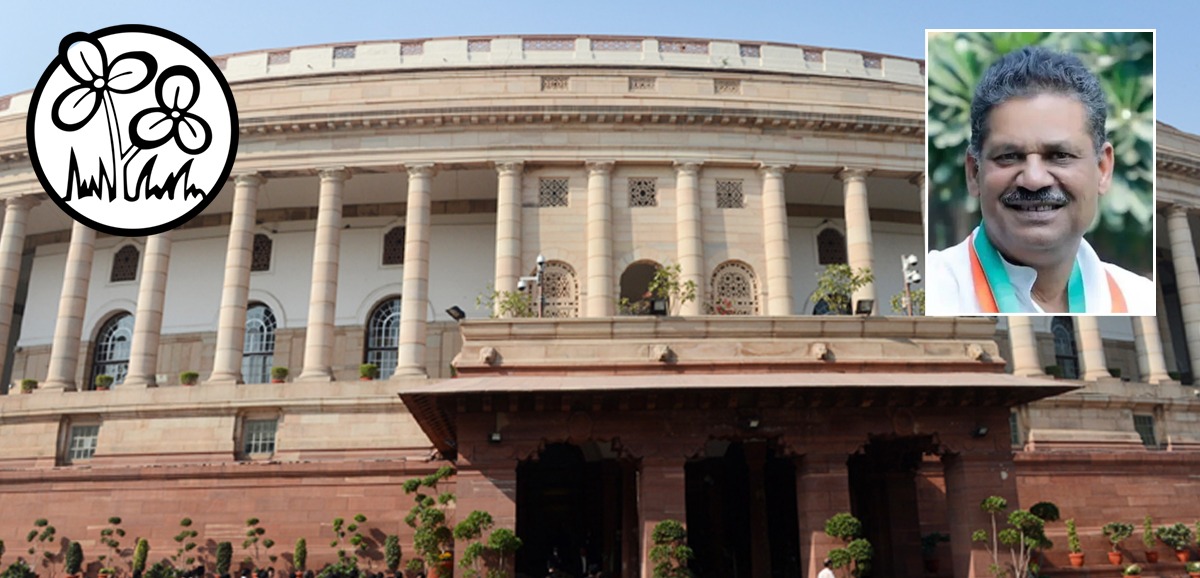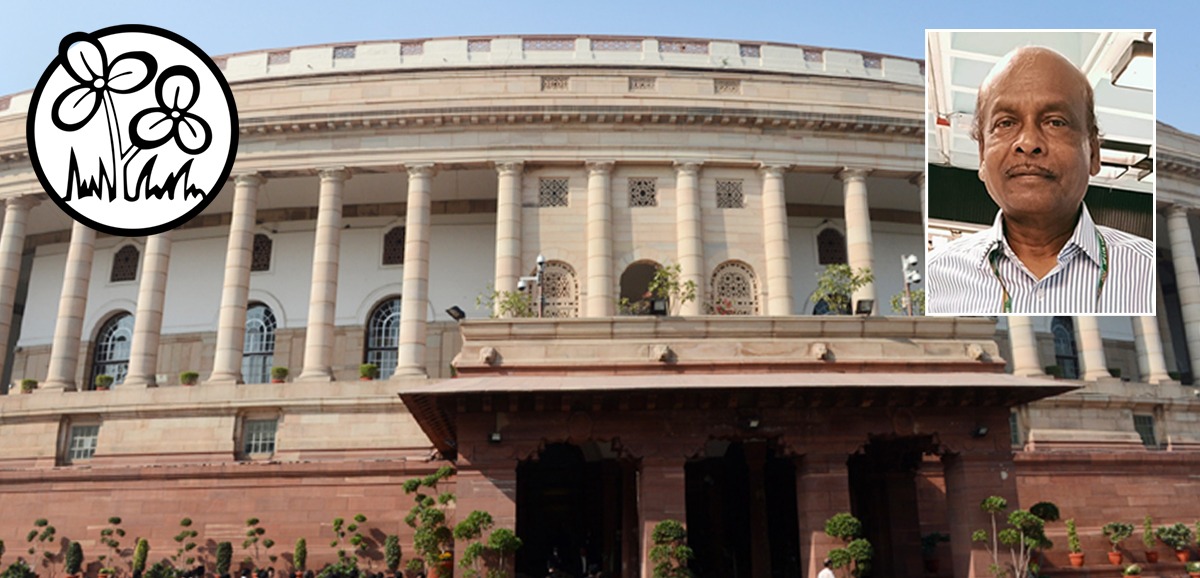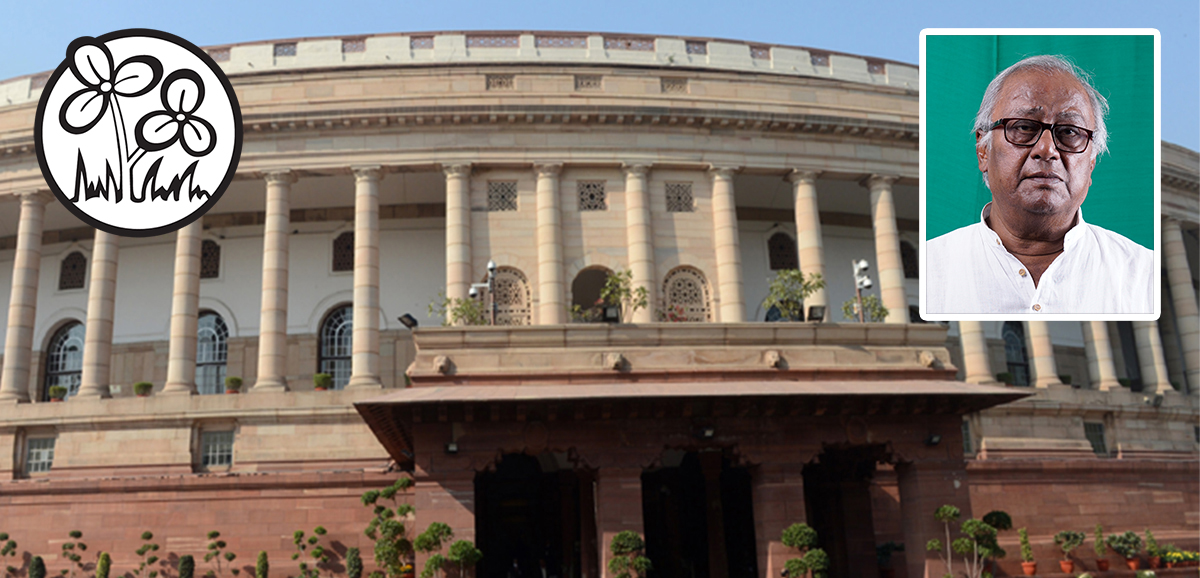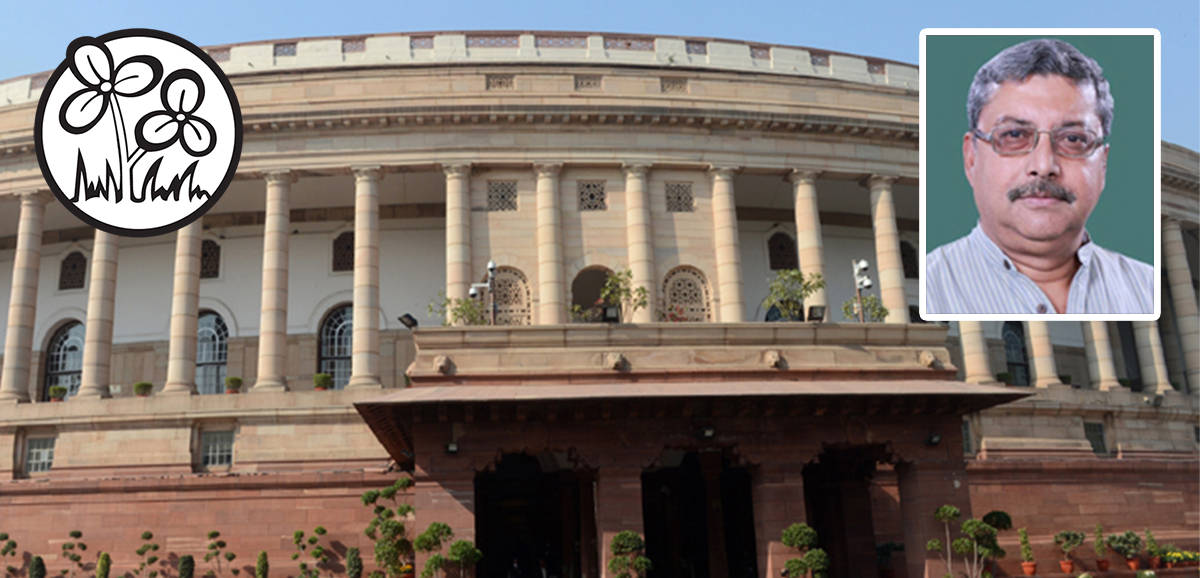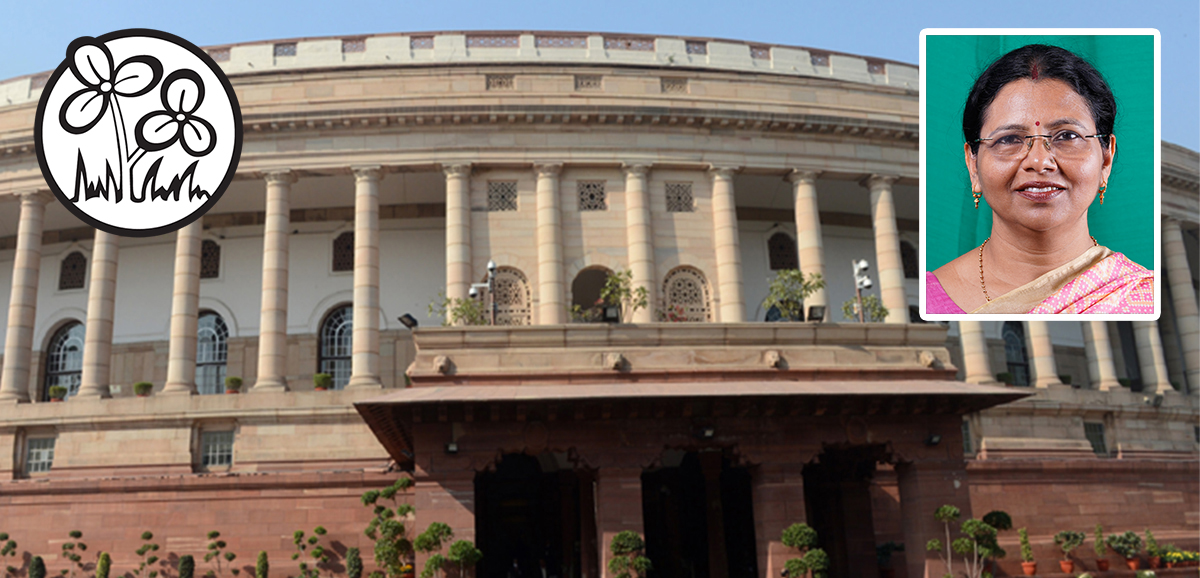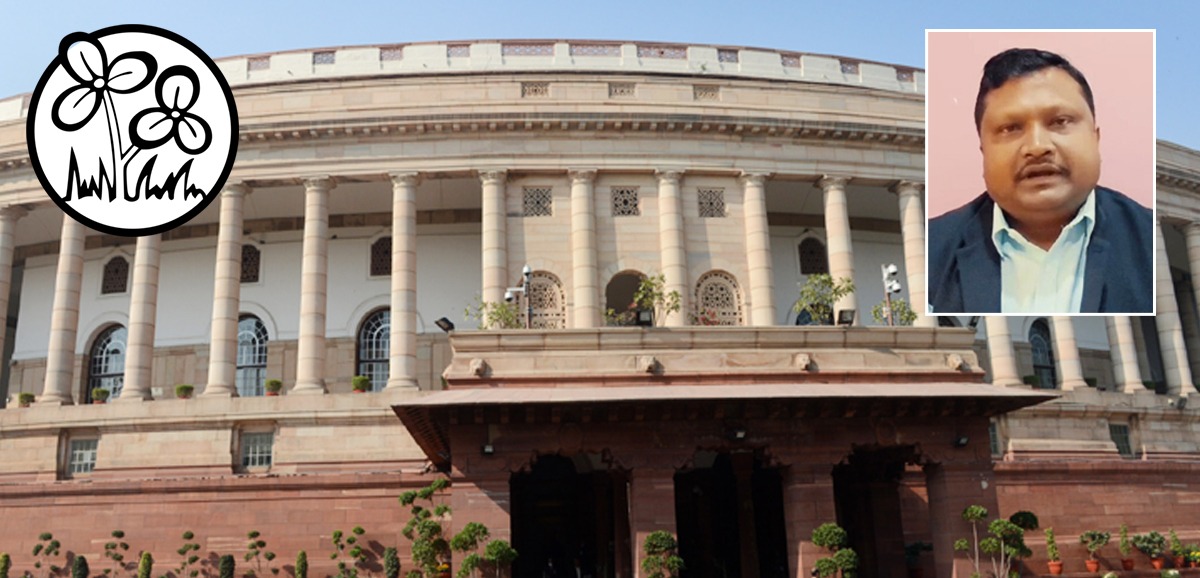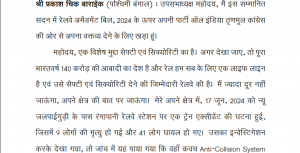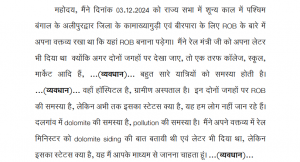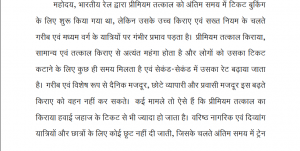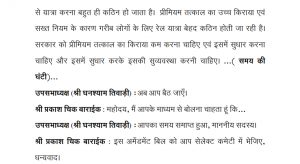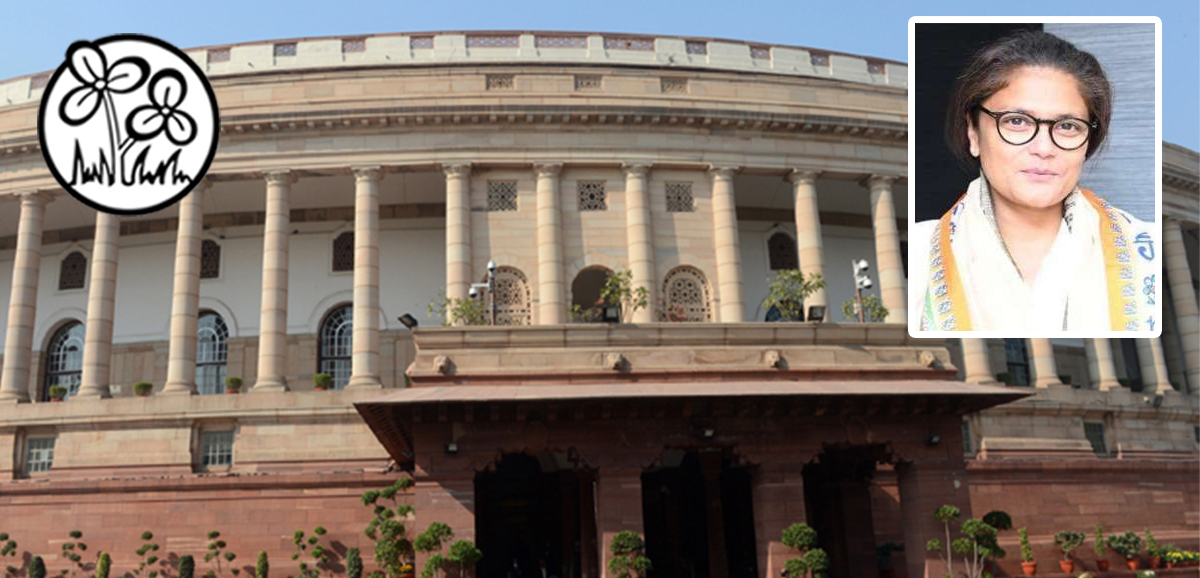सभापकत जी, मैंअपनी नेत्री ममता जी को बहुत धन्यवाद देता ह ं कक उनकी वजह सेमझुेआज सदन मेंअपनी बात रखनेका मौका कमला है। अभी कवमेन एम्पावरमेंट की बात हो रही थी, लेककन उनकी तरफ ककतनी एम्पावरमेंट हुई है, मझुेपता नहीं है। हालांकक मझु सेज्यादा भारतीय जनता पाटीवालों को और कोई नहीं जानता है। कजतनेयहांबैठेहुए हैं, संभवत: उन सभी मेंसेसबसेपरुाना मैंही होऊंगा। मैंउन्हेंभली-भांकत पहचानता ह ं।वेबात भले ही मकहला की करगेंे, लेककन मकहला के कलए कुछ नहीं करगेंे। यह हमारी लीडर ही हैं, कजन्होंने40 प्रकतशत मकहला सांसद इस लोक सभा मेंभेजेहैं। सभापकत जी, हमनेसनुा था कक वर्स2022 मेंभारत पांच कट्कलयन की इकोनॉमी बनेगा।वर्स 2014 मेंजब सरकार आई थी, तब मैंभी उसी तरफ था। मैंनेसनुा था, जब यह कहा गया था कक न खाऊंगा, न खानेदूगं ा, तब मैंनेचार सौ करोड़ रुपयेका भ्रष्टाचार उजागर ककया था। कजस खेल नेमझुेआन-बान-शान दी, मैंकजस खेल मेंदेश के कलए खेला था, वहांपर चार सौ करोड़ रुपयेका घोटाला हुआ था। मैंइनकेपास लेकर गया था। लेककन उस घोटालेके ऊपर कोई चचास नहीं हुई। कजस प्रकार सेकवभीर्ण को लंका सेकनकाल कदया गया था, मझुेभी उसी कवभीर्ण की तरह उस लंका सेबाहर कनकाल कदयागया था। मैंएक-एक चीज़ और राज़ इनके जानताहू ं। मैंउस कवर्य पर अकधक नहीं जाऊंगा। मकहलाओंकेबारेमेंइनकी क्या राय है, वह भी मैंजानताहू ं।वर्स2014 सेमंगुेरी लाल केहसीन सपनेहम सामनेदेखतेरहेहैं। उन हसीन सपनों को कबपूराहोता हुआ देखेंगे, यह मालूम नहींहै। क्योंकक लक्ष्य यह था कक वर्स2022 में, जब अमतृ काल होगा, हमारी आज़ादी के75 वर्सपूरेहोंगेतब सबके सरपर छत होगी। सबके घरों मेंनल होगा। नल मेंजल होगा। गैस होगी, कबजली होगी। लेककन यह लक्ष्य वर्स2047 पर चला गया है। जो वर्स2022 मेंहोना था, वह वर्स2047 पर चला गया है। इस सदन मेंककतनेकज़दा होंगे, नहीं होंगे, मालूम नहीं, वेलक्ष्य देख पाएगं ेया नहीं देख पाएगं े, पता नहीं। यह रूप है, स्वरूप हैकक इतना आगेबढ़ा दो कक इंसान पूछनेवाला न रहे। पांच कट्कलयन इकोनॉमी बनानेकी बात है। बात यह भी थी कक दो करोड़ नौकररयांहर साल लगेंगी। यानी मैं11वां साल न लेकर केवल दस साल ही लेलूं तो आज 20 करोड़ नौकररयां होती और एक पररवार मेंपांच व्यकि लेलूं तो सौ करोड़ लोग इज़्जतदार कज़ंदगी जी सकतेथे। 20 करोड़ लोग नौकरी करतेऔर उनके साथ पांच-पांच लोग पररवार मेंरहतेतो सौ करोड़ लोगों का आराम से जीवन-पोर्ण हो सकता था। लेककन बार-बार सनुनेको यही कमलता हैकक मोदी जी 80 करोड़ लोगों को पांच ककलो राशन देरहेहैं। 25 करोड़ लोगों को अभी गरीबी रखे ा सेकनकाला गया है, यानी कक 105 करोड़ लोग गरीबी रखे ा के नीचेथे। मैंयह कहना चाहता हू ं कक पैसा ककसका है? जो राशन आ रहाहै, वहपैसा ककसकाहै? वहपैसा140 करोड़ लोगों मेंसेउन दो प्रकतशत लोगों काहै, जोइनकम टैक्स देतेहैं। कम सेकम उन टैक्स देनेवालों को धन्यवाद कर दीकजए कक आपसेजो कर कलया जा रहा है, उसके माध्यम से80 करोड़ लोगों को अनाज कमल रहा है। लेककन वह नहीं करगेंे, बात करगेंे मोदी जी की। देश मेंजो लोग हैं, उनको कभी भी धन्यवाद ककया जाए, सो नहीं होगा। पांच कट्कलयन इकोनॉमी की बात होती है। पूंजीपकतयों के14 लाख करोड़ रुपयेके कजसेज को माफ कर कदया जाता है। उन पर 20 प्रकतशत टैक्स लगता है। हम पर 30 प्रकतशत टैक्स लगता है। अगर कोई 36 लाख रुपयेमहीनेमेंकमाता हो, अगर उस पर30 प्रकतशत टैक्स आप पूरेसाल का लगा लेंतो दस लाख रुपयेउसके चलेगए, यानी सवा तीन महीनेका टैक्स गया। उसकेऊपर जीएसटी लगा ली, तो डेढ़ महीनेकी सैलरी, जीएसटी भी18 पसेंट खाने-पीनेआकद सबपर लगीहुईहै, वह चलीगईहै। मतलब पांच महीनेकी उसकी जो आमदनी है, वह टैक्स मेंचली जाती है। पूंकजपकतयों का 14 लाख करोड़ रुपयेमाफ कर कदया जाता है, लेककन वेककसान जो यहां आकर सीमाओंपर 700 लोग मारेगए, कजनकी शहदत हुई, वह जब अपनी मागाँ करनेके कलए आतेहैं, तो उनसेपूछा नहीं जाता। यकद वह लोन पर ट्ैक्टर लेता है, और अगर एक ईएमआई नहीं भरता हैतो बैंक वालेआ कर आ कर उसके यहां सेउसका ट्ैक्टर छीन कर लेजातेहैंऔर वह बेचारा ककसान असहाय रह जाता हैऔर अपने लोन कीपूकतसनहीं करपाता है। जो गरीब आदमी लोन पर मोटरसाइकल खरीदता है, और हमारेघर मेंआ कर, लोगों के यहांखाना बांटता है, आप लोग भी स्वीगी, ज़ोमैटो, कदलंककट सेमंगातेहोंगे।वह बेचारा अगर ईएमआई नहीं देपाता तो आप उसकी मोटरसाइककल ज़दत कर लेतेहैं। उसकेरोज़गार का ज़ररया खत्म, उसका पररवार कफर भूखों मरता है। यह गरीब लोगों के साथ इन लोगों की इस प्रकार की प्रथा है। 30 प्रकतशत टैक्स, दो प्रकतशत यानी140 करोड़ लोगों में2.8 करोड़ लोगइनकम टैक्स देते हैं। 2.8 करोड़ यानी समकझए कक साढ़ेतीन या चार करोड़ लोग टैक्स देतेहैं। उनको 30 प्रकतशत में आप 12 लाख रुपयेकी छूट देतेहैं। लेककन, एक गरीब आदमी, कजन 80 करोड़ लोगों को आपपांच ककलो अनाज देतेहैं, उसको न तो तेल कमलता है, न मसाला कमलता है, न उसकेपास गैस खरीदने की क्षमता है।वह बेचारा क्या करगे ा? ऐसेमेंजीएसटी पर, चाहेतेल हो, साबनु हो, घी हो, पनीर हो, दूध हो, आटाहो, चावल हो, इन सबपर आपनेजीएसटी लगायाहुआ है।वह जीएसटी, चाहेपूंजीपकत हो, चाहेमध्यम वगसका आदमी हो, चाहेगरीब आदमी हो, सब बराबर देतेहैं। डारयेक्ट टैक्स मेंफायदा केवल उन दो प्रकतशत लोगों को हुआ, जो इनकम टैक्स देरहेहैं। अगर इनडायरक्े ट टैक्स में, यानी जीएसटी मेंकमी की जाए तो सभी 140 करोड़ लोगों को फायदा हो सकता है। उनकेखरीदनेकी क्षमता बढ़ सकती है, लेककन वेऐसा नहीं सोचेंगे। मैंनेएक बार पूछा था। अभी यहांराज्य मंत्री जी बैठेहुए हैं। इनसेमैंनेकहा था कक आप क्या करतेहैं, जीएसटी मेंकमी क्यों नहीं लेकर आतेहैं, तोइन्होंनेखड़ेहोकर मझुेजवाबकदया कक पकिम बंगाल का भी नाम जीएसटी मेंहै।… सर, मंत्री जी यहांबैठेहुएहैं, इसकलए मैंनेउनको कदखाया।हुजूर, आपके कबना मैंकहीं जाही नहीं सकता ह ं। आपके कबना हम कहां जाएगं ? े इन्होंनेजवाब कदया कक पकिम बंगाल भी उसी मेंहै। कबल्कुल, मैंमानता ह ं कक पकिम बंगाल भी उसी मेंहै। टोटल 31 राज्य है। इनमेंसे20 राज्य, यानी 16 राज्य मेंबीजेपी तथा चार और कमला देतो एनडीए कमलाकर 20 राज्यों के अंदर इनकी सरकार है।11 राज्य गैर भारतीय जनतापाटी केहैं। टोटल 31 राज्य हुए।इन्होंनेजीएसटी मेंप्रावधान ककया हुआ हैकक केंर सरकार, कजस कदन जीएसटी की मीकटंग होगी, कजतनेसदस्य बठैेहोंगे, उन सदस्यों की एक-कतहाई वोट की पावर सेंट्ल गवनसमेंट केपास होगी। मान लीकजए कक अगर 31 राज्यों का फुल हाउस हो, उसमेंसेएक-कतहाई इनका है, तो 10 हो गया। 21 और 10 राज्य कमलाकर 31 हो गया। 11 राज्य इधर हैं। आपके हाथ मेंइतनी ताकत है, आप जीएसटी काउंकसल की बात करते हैं।… सभापकत महोदय, मैंयही बात कह रहा ह ं। आपनेकबलकुल सही बात कही। आपनेकील के माथेपर हथौड़ा मारा है। You have hit the nail on the head. अगर इनकेवोट में10 कमला लूं तो इनके31 लोग हैं। इनके20 राज्य हैं। उसकेऊपर 10 राज्य आए। जब ये30 लोग बैठेहुए हैंतो कफर तेल, पनीर, घी, दूध, आटा, चावल का रटे कम कर सकतेहैं, क्योंकक वहांइनकी ही मेजॉररटी है। जीएसटी काउंकसल मेंतो इनको ही मेजॉररटी बनानी है, ककसी और को थोड़ेही बनानी है। सभापकत महोदय, आपनेजो कहा, उसकेअनसुार मैंनेभी सही कहा। यहांकंसेंसस है। आपने जो कहा, वही फैक्ट मैंनेआपके सामनेकही। एक बार हमनेपयाज कीबात सुनी। माननीय कवत्त मंत्री महोदया सेकहा गया कक पयाज के दाम बहुत बढ़ गए हैं। तब उन्होंनेकहा कक मैंपयाज नहीं खातीह ं, इसकलए मझुेपयाज का दाम नहीं मालूम है। सभापकत महोदय, पेट्ोल और डीजल तो हम भी नहीं खातेहैं, लेककन दाम तो मालूम है। … We do not eat petrol and diesel like she does not eat onions, but yet we know the price. हमेंपेट्ोल और डीजल का प्राइस मालूम है। सेंट्ल गवनसमेंट नेपेट्ोल पर 19.9 रुपयेप्रकत लीटर कीएक्साइज ड्यूटी लगायीहुईहै। डीजल पर5.8 रुपयेप्रकत लीटरएक्साइज ड्यूटी लगायी हुई है। इन्होंनेइन कदनों इसको बढ़ाया हुआ है। कजस समय स्वगीय मनमोहन कसंह जी हमारेप्रधानमंत्री थे, उस समय कच्चेतेल की कीमत 112 डॉलर प्रकत बैरल थी। मैंकदल्ली की बात करता ह ं। उस समय पेट्ोल 65 रुपयेप्रकत लीटर था। कजस समय माननीय नरन्ेर मोदी जी यहांपर प्रधानमंत्री बन कर आए, उस समय कच्चेतेल की कीमत 60 डॉलर प्रकत बैरल थी। उस समय जब बात चलती थी, तब हम भी खड़ेकरके कचल्लातेथे, बहुत हुई महंगाई की मार, पेट्ोल-डीजल की मार, अबकी बार टन, टन, टन सरकार। … (व्यवधान) अब वही बोलना पड़ेगा न, क्योंकक हुआ कुछ नहीं। हम यही बोलतेथे। पेट्ोल तब 60 रुपयेप्रकत लीटर था। … मनमोहन कसंह जी के समय 112 डॉलर प्रकत बैरल था, तब पेट्ोल 65 रुपयेथा। आज वर्स2025 में80 डॉलर प्रकत बैरल है, लेककन पेट्ोल और डीजल सेंचरुी मार रहेहैं, बेचारेकवराट कोहली और रोकहत शमासको सेंचरुी मारनेमेंबहुत मकुश्कल हो रही है। तीन सालों सेसेंचरुी पर बैठे हैं, आप क्यों नहीं एक्साइज ड्यूटी कम करतेहैं? कर देंकम और नहीं तो लेआइए जीएसटी में। इन्हीं की मेजोररटी है। सभापकत जी, अगर आप कहेंतो इनका जवाब देदू। सबसेकम दाम अगर पेट्ोल और डीजल के कहीं ककसी राज्य मेंहैं, तोवहपकिम बंगाल केअंदरहैं।… ) कगररराज जी, अपनेकबहार सेजाकरहमारे यहां भरवा लीकजए।… : येमेरेघर मेंआकर, वर्स1999 मेंमेरेपास एमएलसी बनने के कलएबैठा करतेथे। मैंक्या बोलूं? : येमझुेबताएगं े। इनको बात करनेका तरीका नहीं। इनको बात करनेकी तमीज नहीं। क्या येभारतीय जनता पाटी के संस्कार हैं? इनको बात करनेकी तमीज नहीं। अपनेसेबड़ों सेकैसी बात की जाती है, इन्हेंयह नहीं मालूम। सदन मेंककस तरीके सेबात की जाती है, इनको यह नहीं मालूम। येतमु-तमु करकेबात कर रहेहैं। मैंइनसेआपआप करकेबात कर रहा ह ं।… इनका भगवान कुछ नहीं कर सकता। येदेकखए, तमु करकेबोलतेहैं। यह तमीज है। मैंआपसेबात कर रहा ह ं। … : मैंआपसेबात कर रहा ह ं। आप सनु रहेहैंकक वेक्या बोल रहेहैं। सभापकत जी, 1 लाख 70 हजार करोड़ रुपया जो पकिम बंगाल का बकाया है, वह वर्स2022 सेपकिम बंगाल को नहीं कदया गया, कजसमेंएक जीएसटी है। 1 लाख 70 हजार करोड़ रूपया, जो पकिम बंगाल का कहस्सा है, वर्स2022 सेपकिम बंगाल को नहीं कदया गया। उसमेंजीएसटी का भी कहस्सा है। फेडरल इकोनामी हैतो फेडरल जीएसटी तो आना चाकहए। आपनेआवास कापैसा नहीं कदया, तो पकिम बंगाल की नेत्री ममता बंदोपाध्याय नेलोगों को आवास का पैसा कदया। इन्होंनेस्कूलों के कलए पैसा नहीं कदया, सवस कशक्षा अकभयान के कलए नहीं कदया।वह भीपकिम बंगाल की नेत्री ममताबंदोपाध्याय नेअपनेबजट सेकदया। घर नहीं कमले, उसका भी बजट पकिम बंगाल की नेत्री नेकदया। इन्होंनेआपकत्तयां उठाई, ं आपकत्तयों का जवाब कदया गया। यूटीलाइजेशन सकटसकफकेट कदयागया, सब कुछ होगया, जीएसटी काउंकसल मेंबैठक हुई, हेल्थ यानी स्वास््य को लेकर सब बातेंहुई।ं ‘स्वास््य साथी’, ममता बनजी की सरकार वहां चलाती हैं, उसेसबसेबकढ़या स्कीम कहा गया। ‘स्वास््य साथी’ जो ककसीपररवार मेंसबसेबड़ी मकहलाहोतीहै, उसके नाम सेयह काडसहोता है, प्राइवेट हो या पकदलक अस्पताल हो, मकहला, उसकापकत, मा-ाँबाप, सास-ससरुऔर उनकेबच्चे ककसी भी कनकटतम अस्पताल मेंजा सकतेहैं, उपचार करा सकतेहैं। डायरक्े टली सरकार की तरफ सेहॉकस्पटल मेंपैसा कदया जाता है। केन्र सरकार सेजो कमलता है, उसमेंअनेकों मानक हैं, छत है तो नहीं कमल सकता ह, ै मोटरसाइककल हैतो नहीं कमल सकता, साइककल हैतो नहीं कमलेगा, यह सकुवधा2011 के सेन्सस सेहै। सभापकत महोदय, सकंवधान के ककस प्रावधान या ककस धारा मेंयह कलखा हुआ हैकक ककसी एक रगं मेंअगर स्कूल या अस्पताल को रगेंगे तोपसै ा कमलेगा। क्या कहन्दूधमसमेंएक ही रगं है, कहन्दूधमसमेंअनेकों रगं हैं। हमारेसनातन मेंअनेकों रगं ह।ैंयेचाहतेहैंकक केवल भगवा मेंरगं दें। लेककन भगवा के भी अनेकों रगं ह।ैं महादवे के कसर मेंचन्रमा इठलाता है, वह सफेद है, सोमवार सफेद है, चन्रमा का सफेद रगं है। मंगल हनम ु ान जी का हैतो लाल ह।ैबध ु प्रकृकत हैतो हरा है, बहृस्पकत देवताओंके गरू ु हैंतोपीलाह।ैशि ु चायसराक्षसों केगरू ु हैंतो राख है। शकन महाराज का काला या नीला है। हमारेसूयसदेव इंरधनर् ु ी हैं, सतरगं ेह।ैंउत्तर मेंकशव हैंतो सफेद हैं, दकक्षण मेंअय पपन हैतो कालेह, ैंपूरब मेंमााँकालीहैंतो लाल कसंदरू और लाल टीकाहै।पकिम मेंगणेश हैंतो पीला ह, ै कफर केवल भगवा कैसेमेरा कहन्दूधमसका रगं है, मझु ेसमझ नहीं आता है। क्या आप चन्रमा को भगवा करगेंे? क्या हनम ु ान जी को भगवा करगेंे, क्या मरेी बहन, बेटी और मााँके लाल कसन्दूर को भगवा करगेंे? मेरेपकिम बंगाल का रगं सफेद और नीलाहै। नीला शकन महाराज का रगं है। येनीले को भगवा करना चाहतेहैं। वर्स2021 मेंजब नीला करनेके कलए आयेथे, जब अपना ध्वज गाड़नेआयेथेतो वर्स 2021 मेंशकन महाराज का ढ़कहया लग गया। इस बार वर्स 2026 मेंआएगं ेतो साढ़ेसती लगनेवाली है, इस चीज को आप ध्यान मेंरकखएगा। मैं अपनीबात समाप्त करताह, ं बहुत-बहुत धन्यवाद।बोलनेके कलएबहुत क ु छ था लेककन मेरे साथी नेसमय लेकलया, इस कारण मझु ेअपनेविव्य को छोटा करना पड़ रहा ह।ै मैं आपका धन्यवाद करता ह
